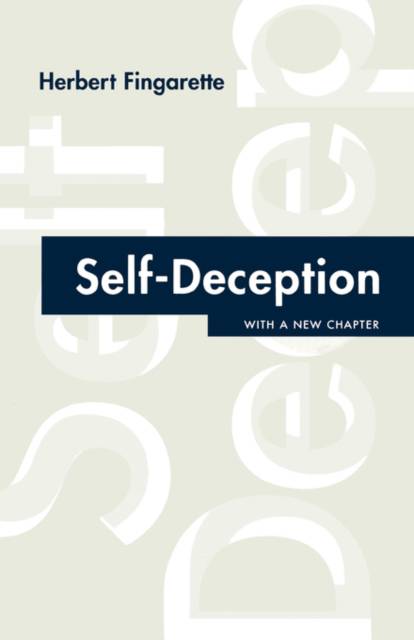
Je cadeautjes zeker op tijd in huis hebben voor de feestdagen? Kom langs in onze winkels en vind het perfecte geschenk!
- Afhalen na 1 uur in een winkel met voorraad
- Gratis thuislevering in België vanaf € 30
- Ruim aanbod met 7 miljoen producten
Je cadeautjes zeker op tijd in huis hebben voor de feestdagen? Kom langs in onze winkels en vind het perfecte geschenk!
- Afhalen na 1 uur in een winkel met voorraad
- Gratis thuislevering in België vanaf € 30
- Ruim aanbod met 7 miljoen producten
Zoeken
Omschrijving
With a new chapter
This new edition of Herbert Fingarette's classic study in philosophical psychology now includes a provocative recent essay on the topic by the author. A seminal work, the book has deeply influenced the fields of philosophy, ethics, psychology, and cognitive science, and it remains an important focal point for the large body of literature on self-deception that has appeared since its publication.
How can one deceive oneself if the very idea of deception implies that the deceiver knows the truth? The resolution of this paradox leads Fingarette to fundamental insights into the mind at work. He questions our basic ideas of self and the unconscious, personal responsibility and our ethical categories of guilt and innocence. Fingarette applies these ideas to the philosophies of Sartre and Kierkegaard, as well as to Freud's psychoanalytic theories and to contemporary research into neurosurgery. Included in this new edition, Fingarette's most recent essay, "Self-Deception Needs No Explaining (1998)," challenges the ideas in the extant literature.
This new edition of Herbert Fingarette's classic study in philosophical psychology now includes a provocative recent essay on the topic by the author. A seminal work, the book has deeply influenced the fields of philosophy, ethics, psychology, and cognitive science, and it remains an important focal point for the large body of literature on self-deception that has appeared since its publication.
How can one deceive oneself if the very idea of deception implies that the deceiver knows the truth? The resolution of this paradox leads Fingarette to fundamental insights into the mind at work. He questions our basic ideas of self and the unconscious, personal responsibility and our ethical categories of guilt and innocence. Fingarette applies these ideas to the philosophies of Sartre and Kierkegaard, as well as to Freud's psychoanalytic theories and to contemporary research into neurosurgery. Included in this new edition, Fingarette's most recent essay, "Self-Deception Needs No Explaining (1998)," challenges the ideas in the extant literature.
Specificaties
Betrokkenen
- Auteur(s):
- Uitgeverij:
Inhoud
- Aantal bladzijden:
- 189
- Taal:
- Engels
Eigenschappen
- Productcode (EAN):
- 9780520220522
- Verschijningsdatum:
- 23/02/2000
- Uitvoering:
- Paperback
- Formaat:
- Trade paperback (VS)
- Afmetingen:
- 140 mm x 210 mm
- Gewicht:
- 231 g

Alleen bij Standaard Boekhandel
+ 91 punten op je klantenkaart van Standaard Boekhandel
Beoordelingen
We publiceren alleen reviews die voldoen aan de voorwaarden voor reviews. Bekijk onze voorwaarden voor reviews.









